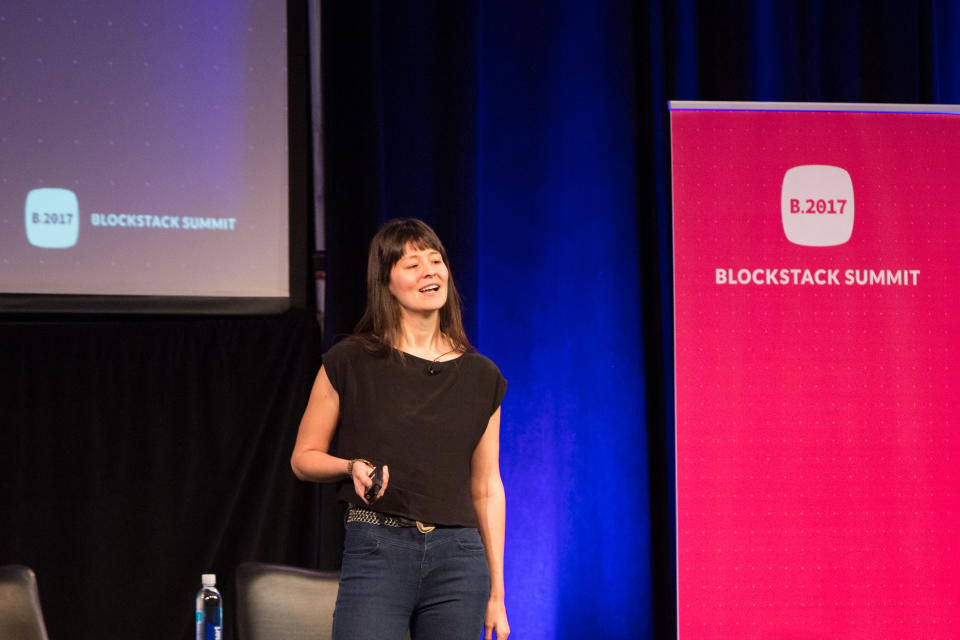Lightning Labs CEO: We are back to a 'bitcoin, not blockchain' world
In 2016, a popular ethos emerged among big banks and Wall Street types: bitcoin is doomed, but blockchain is exciting. Big name after big name in banking and financial services touted their new blockchain test pilots, and even posted lots of blockchain-related job openings.
For Lightning Labs CEO Elizabeth Stark and others working on bitcoin software, that narrative was never accurate. And now, after the staggering price surge of bitcoin, litecoin, ether, ripple, and other digital assets at the end of 2017, the pendulum appears to have swung back toward cryptocurrencies themselves.
Stark tells Yahoo Finance a story, one she says she has never told publicly (see the above video), that illustrates how overpowering the ‘blockchain, not bitcoin’ narrative became for a while. “When we first pitched my company Lightning Labs, we actually took the word ‘bitcoin’ out of our deck and our marketing material because it was so much about blockchain,” she says. “Now, I feel like we’ve entered into a ‘bitcoin, not blockchain’ world, where people understand the value of cryptocurrency technology and what these can bring. You also have proof of work in bitcoin, you have the public/private key cryptography. There are other things that make bitcoin special. Somehow, the blockchain part got separated and became a thing.”
Lightning is a second layer built on top of the bitcoin protocol that can facilitate faster and cheaper transactions, because the payments happen off-blockchain. Put simply: On a blockchain, which is a decentralized peer-to-peer ledger, thousands of computers have to all verify all the transactions. On Lightning, transactions are verified off-chain between the participants in a transaction, relying on blockchain only for security if something goes awry. Joseph Poon and Thaddeus Dryja published the Bitcoin Lightning Network white paper in 2015, describing the project as “scalable off-chain instant payments.”
Now Lightning Labs, helmed by Stark, has launched the beta of its Lightning software, LND. It is the first live software release for the Lightning protocol; the software can facilitate Lightning transactions in bitcoin or litecoin. Developers are now quickly building apps for Lightning (called “Lapps”), including an ice cream delivery service.
Lightning Labs also closed a round of seed funding from a slew of big names: Square and Twitter CEO Jack Dorsey; litecoin creator Charlie Lee; Robinhood co-founder Vlad Tenev; and Digital Currency Group, the biggest cryptocurrency startup investment firm, helmed by Barry Silbert.
“There’s all sorts of things that can be done when you have instant, high volume,” says Stark. “We’re talking many thousands of transactions per second, one day maybe even millions per second… Bitcoin at its base layer can’t do that. But Lightning, because it’s this layer on top of it, can.” Stark cites Visa’s transactions-per-second on its rails, and adds, “We want to go even beyond that.”

For a few years now, onlookers have speculated that the bitcoin technology still needs a “killer app” — a reason for the average person to want to buy and use bitcoin, beyond just holding it as a speculative investment. But bitcoin believers and developers have long retorted that bitcoin itself, as a currency and vehicle for sending payments, is the killer app.
Lightning may eventually prove to be the best application of that thinking. And amidst the ongoing frenzy of initial coin offerings (ICOs), in which cryptocurrency startups create and sell their own digital token, Stark promises, “There is no Lightning ICO. If you’re excited about Lightning, you can buy some bitcoin. I’ve been an ICO skeptic on Twitter.”
As for the price of bitcoin, which is down a staggering 53% in 2018 so far, Stark says bitcoin is being unfairly compared to that all-time high from the end of 2017, and that people make too much of the price.
“I kind of want things to calm down a bit — big price spikes aren’t good for us technical folks that are developing,” she says. “We are in the early days of bitcoin. This is a marathon, it’s not a sprint. I think people wanted it to be a sprint, but it’s going to take time.”
—
Daniel Roberts covers bitcoin and blockchain at Yahoo Finance. Follow him on Twitter at @readDanwrite.
Read more:
How to report bitcoin gains on your taxes
Warning: An ICO is not like an IPO
